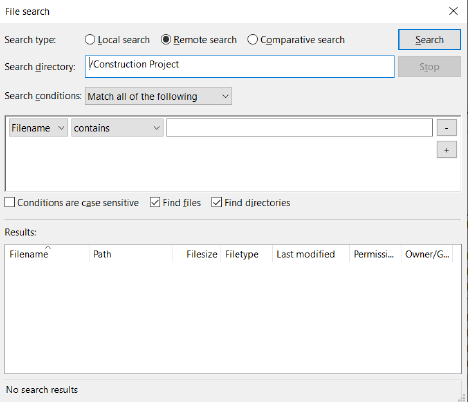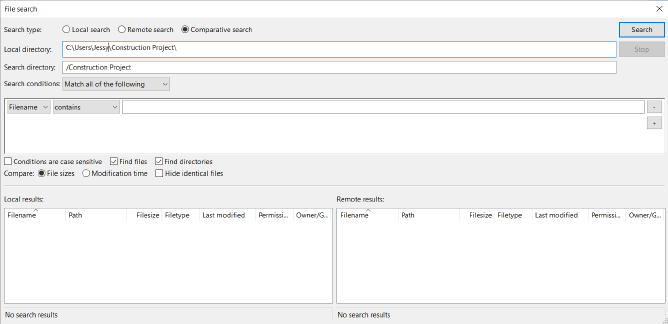How to Check if File Is Uploaded to Server Filezilla
Below yous notice a step by footstep guide, if you prefer y'all can lookout man our How to Search for Files video tutorial.
Search for files
If yous need to find a particular file on the local motorcar or remote server:
- Connect to the server in FileZilla Pro.
- In the main menu, click on Server > Search remote files
Alternatively, press the F3 key.
The File search window will be displayed.
- Choose the search time from the Search type radio buttons. Selection Local search if you
desire FileZilla Pro to expect on your local computer (the one that yous're using), or Remote
search to look on the remote server that FileZilla Pro is currently connected to. Select
Comparative search to simultaneously search both your local computer and the remote
server. The results are so presented and compared. - Enter the directory that yous want to search in. The search is recursive, significant that
FileZilla Pro will too search all sub-directories in the specified directory.
For example, enteringD:\would cause FileZilla Pro to search all of D:, just entering D:\Programme Files would cause FileZilla Pro to only search in theProgram Filesdirectory, its sub-directories, their subdirectories, and etc. In the comparative search type yous have to enter both the local and remote directories. - Select a search method from the Search atmospheric condition driblet down list:
- Lucifer all of the following: FileZilla Pro will only show a file if it meets every single search condition that you've set up.
- Match any of the following: FileZilla Pro will brandish a file if it meets ane or more of the search conditions that yous've gear up.
- Match none of the following: FileZilla Pro will but brandish a file if it doesn't run into the criteria of every single search condition that you've set.
- Friction match not all of the following: FileZilla Pro will display all files that don't run into the criteria of one or more of the search conditions that you've ready.
- Fix at least 1 search condition.
In the first column, select what FileZilla should search on
- Filename: Wait at the name of the file, including its extension (eg. .doc). Requirements:
alphanumeric characters; tin can include punctuation.
- Filesize: Wait at the size of the file. Requirements: numeric characters only.
- Path: Expect at the names of the directory and subdirectories in which the file is
found. Requirements: alphanumeric characters; can include punctuation.
- Appointment: Expect at the date on which the file was created or last modified. Requirements:
Numeric characters in YYYY-MM-DD format. For case, April 1, 2019
would be entered as 2019-04-01. Employ hyphens as separators.
In the 2d column, select the type of search to employ:
- contains: Search for files and directories in which the proper noun includes
the text entered. For case, searching on 'word' using this option could return both My Give-and-take File.docx and Sword-and-sorcery.epub.
- is equal to: Search for files and directories with a name that exactly
matches the text entered. For instance, searching on 'word.docx'
would only return files named give-and-take.docx.
- begins with: Search for files and directories with a proper name starting with
the text entered. For example, searching on 'word' using this option
could render Word of the Twenty-four hours.xls merely non My Discussion File.docx or Swordand-
sorcery.epub.
- ends with: Search for files and directories with a name that ends with
the text entered. This includes the filename and extension; for instance,
searching on 'dr.' could return caradoc and hustle.doc.
- matches regex: Use regular expressions in your search criteria.
Available search parameters:
- .: employ a period to substitute for a unmarried grapheme. For example,
searching onf.llcan return fell.txt and fill.txt.
- *: apply an asterisk afterwards a character to search for whatsoever number of
that graphic symbol in the specified place in the string. For case,
searching ontex*ttin render tet, text, texxt, texxxxxxxxt, etc.
- ?: use a question marking after a character to search for 0 or i
uses of that character in the specified place in the string. For
example, searchingtex?tcan return tet or text, but not texxt.
- ^: use a caret marking to search for all file names beginning with
the character(south) subsequently it. For instance, searching on ^t would
return all files with names beginning with a t.
- $: use a dollar sign to search for all file names ending with
the character(s) earlier it. For example, searching on b$ would
return all files with names ending with a b.
- \: utilise a backslash character to 'escape' the following character,
telling FileZilla Pro to treat it as a normal character and not equally a
search expression. For example, if yous want to search for text
files, y'all could search on \.txt.
- .: employ a period to substitute for a unmarried grapheme. For example,
- does not contain: Search for files and directories that do not have the
entered text in any office of their name. - greater than: Search for files larger than the specified size.
- equals: Look for files at the specified size, or created or modified on
the date entered. This is exact; FileZilla Pro doesn't include a margin
of error for this option. - does non equal: Expect for files that are of whatever but the specified size,
creation or modification appointment. - less than: Search for files smaller than the specified size.
- before: Search for files created or modified before the specified date.
- later on: Search for files created or modified after the specified date.
In the third column, enter the search parameters for FileZilla to use:
- Filename and Path: Use alphanumeric characters; can include punctuation.
- Filesize: Employ numeric characters only.
- Appointment: Apply numeric characters in YYYY-MM-DD format with hyphens as separators.
For case, April i, 2019 would be entered every bit 2019-04-01.
Create another search status, click on the + button to the right and underneath
the lesser condition.Delete a search condition y'all've created, click on the – to its right.
- Filename: Wait at the name of the file, including its extension (eg. .doc). Requirements:
- To make the search example-sensitive – for example, if you've entered lower-instance letters,
to ensure that FileZilla Pro simply returns results using the lower-instance string and non
a combination of upper- and lower-case, or all upper-case – tick the Weather are
instance sensitive checkbox. - To find files that lucifer the search criteria, tick the Discover files checkbox.
- To find directories that match the search criteria, tick the Observe directories checkbox.
- In the comparative search the comparison is based on file sizes simply you can change
to compare based on the file modification fourth dimension. - Also in the comparative search tick Hide identical files to hide the files are identical
according to the comparing criteria. - Click on Search to offset the search process.
The video tutorial below shows how to search files and how to use comparative search with FileZilla and FileZilla Pro.
Video tutorial: FileZilla Ultimate Search Files Tutorial.
Tags: file, FileZilla search for file, search for file
Source: https://filezillapro.com/docs/v3/getting-started/search-for-files/



0 Response to "How to Check if File Is Uploaded to Server Filezilla"
Post a Comment